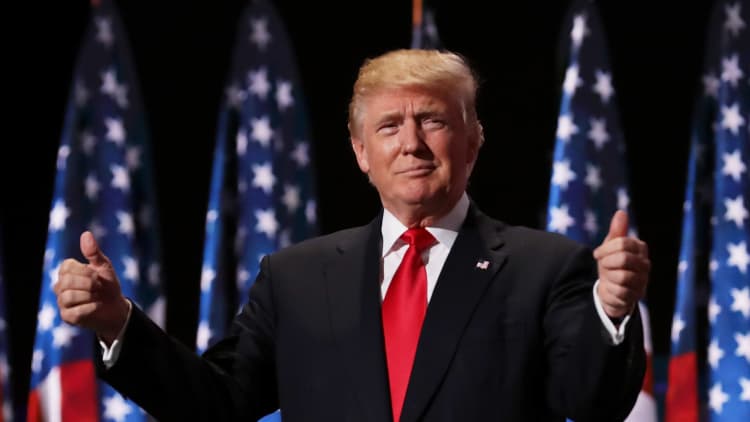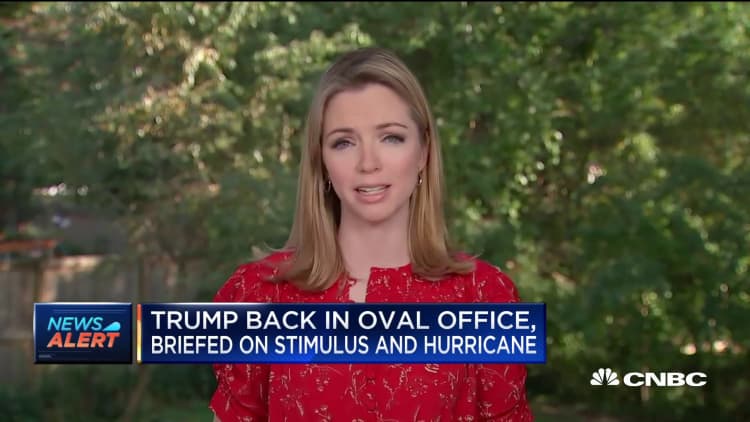
President Donald Trump said Thursday that he's not contagious "at all" days after he was discharged from the Walter Reed National Military Medical Center after a brief stay to treat him for Covid-19.
"First of all, I think I'm better. I'd love to do a rally tonight. I wanted to do one last night, but I think I'm better to a point that I feel better than I did, I jokingly said, 20 years ago. I feel perfect. There's nothing wrong," he told Fox Business' Maria Bartiromo on a call Thursday morning. "I don't think I'm contagious at all."
The president added that he wouldn't attend a rally if he were contagious.
The Centers for Disease Control and Prevention says people "with mild to moderate COVID-19 remain infectious no longer than 10 days after symptom onset." People with more severe symptoms can remain infectious for longer, it says.
White House officials said Trump started exhibiting symptoms about a week ago. He was admitted to the hospital on Friday. Trump's physician Dr. Sean Conley said that the president's oxygen levels dipped twice early in the course of the disease and he was briefly administered supplemental oxygen.
The CDC adds that it's appropriate to discontinue "transmission-based precautions" in health-care settings if at least 10 days have passed since symptom onset, 24 hours have passed since last fever and other symptoms, such as shortness of breath, have improved.
The president was treated with an experimental antibody-based treatment made by Regeneron as well as the antiviral drug remdesivir made by Gilead and dexamethasone, a cheap and widely available steroid. Many doctors say they typically reserve the use of remdesivir and dexamethasone for more severely sick patients.
On Wednesday, Conley said in a memo that the president had been fever-free for more than four days and free of symptoms for over 24 hours.
The president on Thursday attributed his seemingly swift recovery to Regeneron's antibody cocktail, which has not been authorized and is not available to most Americans. Though he added, "I would have done it fine with no drugs. You don't need drugs."
Trump previously called the Regeneron treatment "a cure" and called for the Food and Drug Administration to authorize its use on an emergency basis. Regeneron said late Wednesday that it submitted an application to the FDA to approve it for emergency use.
The president also hailed a similar drug produced by Eli Lilly, which also announced Wednesday that it submitted its request for emergency authorization to the FDA.
Shares of Regeneron were up nearly 3% higher and Eli Lilly stock was up about 1.5% in early trading Wednesday.
The president's comments come as the virus tears through the White House. The virus has infected "34 White House staffers and other contacts" in recent days, according to an internal memo from the Federal Emergency Management Agency that was obtained by ABC News.
Throughout the pandemic, the president has repeatedly questioned public health guidance, such as mask wearing and social distancing, designed to help contain the spread of the virus. On Wednesday, BuzzFeed News pulled its reporter out of the White House press pool, saying that Trump administration aides have "largely not worn masks" or abided by other basic coronavirus protections.

Dr. Leana Wen, former Baltimore health commissioner, said the president's comments are "truly unbelievable."
"Just less than a week ago, the president was in a hospital being treated for severe illness," she said in a phone interview. "It's very likely that he's still shedding virus right now."
Wen, who is an emergency physician and public health professor at George Washington University, added that the president appears to have had a severe case of Covid-19, which means he'll likely remain infectious for longer than just mildly ill patients.
"By definition, this is not a mild case," she said. "We know also that patients with more severe illness could end up having a higher viral load and be infectious for longer."
She added of the president's comment that he is considering holding a rally, "It's just mind blowing" and said that "the White House is a hotbed of infection. It is the epicenter of a major outbreak."
Dr. Syra Madad, senior director of the systemwide special pathogens program at New York City Health + Hospitals, said that by refusing to quarantine for the appropriate length of time, Trump is demonstrating a "complete disregard for public health guidance."
"This is about the rest of the nation. If [Trump's] not going to isolate for that full period when he may be infectious, then, as a doctor, why would we tell other people to do the same?" she said in a phone interview. "Why should they listen to us when the president of the United States isn't abiding by his own public health measures?"
She said the president should isolate for at least 10 days, as the CDC guidance says.
"It's not like these days have been chosen out of a bucket," she said. "They've been based on actual information, evidence that we know about this particular disease."


